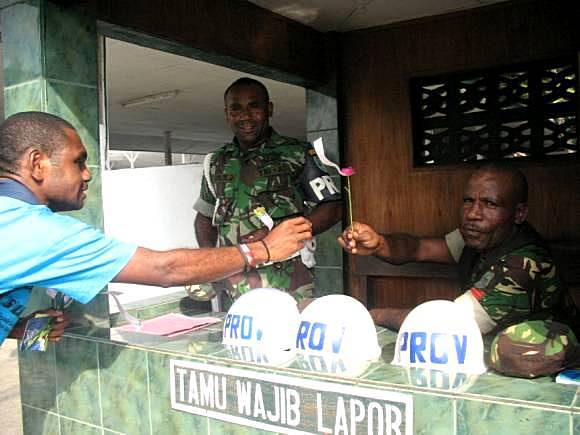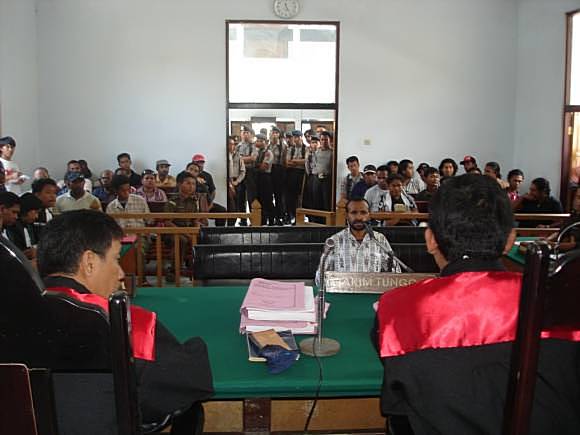Conflict resolution should move from a security to a justice approach
Muridan S Widjojo
Abepura Court 2006: Justice remains a mirageTim Advokasi Papua Tanah Damai |
The Indonesian government has so far treated Papuan claims for independence and allegations of human rights abuse as potential threats to national security. The government’s policy goal appears to be to paralyse the Papuan independence movement so it will not endanger Indonesia’s territorial integrity. It is pursuing this goal through a security approach: using military and intelligence operations.
This approach creates unnecessary and violent tension between those Indonesians and Papuans who advocate the Unitary State of the Republic of Indonesia and those Papuans who insist upon an independent Papua. As a result, resources in Jakarta and Papua are wasted on political measures that are reactionary, symbolic and, ultimately, irreconcilable. The security approach does not address the heart of the conflict. Rather, it breeds further conflict and discontent.
A team from the Indonesian Institute of Sciences (LIPI) has recently drawn up the ‘Papua Road Map’, a model for conflict resolution that adopts a justice approach. The aim of the Road Map is to provide new insight to decision makers within state institutions and the NGO community. It hopes to encourage a shift in approach to the conflict and to stimulate a willingness to take new steps to achieve justice for Papuans. The Road Map ultimately aims to promote an outcome whereby Indonesia (with Papua inside) enters into a new, constructive, and progressive phase. The justice approach has four key dimensions – recognition, development, dialogue and reconciliation.
Recognition
Essentially, Indonesia must recognise Papuans as traditional ‘owners’ of the land. Recognition requires that Indonesia respond to a number of pressing problems that have caused the marginalisation of indigenous Papuans in Papua. First is the radical demographic change that has brought dislocation and displacement. In 2005 the immigrant population was estimated to account for 41 per cent of the population in Papua and this is expected to jump to 53.5 per cent by 2011. Indigenous Papuans will soon become a minority in Papua.
The immigrants, meanwhile, are already dominant in most sectors. For example, immigrants have been more successful in commercial agriculture, and they have gained control of local markets. This contributes to a collective Papuan sense that they are under threat in their own land.
Recognition must also focus on Papuans and their identity. It should include a social strategy of positive affirmation. It should support processes that will help individuals and local institutions compete more effectively in the market and be better able to protect their interests in the struggle for control of resources. This will assist Papuans to negotiate more effectively for status and resources in this period of rapid social change, to ensure Papuans enjoy the benefits of development. In practice, this will mean providing Papuans with better schooling to create a well-educated class. Specialist business and economic training is needed to develop sufficient numbers of Papuan businessmen. Government policy should provide the necessary bridge between preparing individual Papuans to compete independently and raising the general level of prosperity of Papuans.
Finally, recognition must also accommodate the symbols and other expressions of Papuan culture, and treat them as part of the richness of Indonesian culture.
Development
Economic development has long been a government aim, but in practice it has left many vulnerable groups behind. A new paradigm for development in Papua is necessary to raise the quality of life of Papuans to the level of other Indonesian citizens. This is linked closely with the training advocated as part of the policy of recognition. Development programs must be able to meet the basic needs and rights of Papuans in education, health and economic welfare. Papuans must have the capacity to participate effectively in and feel themselves part of the project of social change in Papua. This will ensure that Indonesia and Indonesian-ness is considered integral to the provision of public services, which will gradually help Papuans to feel comfortable in and proud of being a part of Indonesia.
…resources in Jakarta and Papua are being wasted in pursuit of political measures that are reactionary and symbolic in nature and, ultimately, irreconcilable
A new development paradigm for Papua is required because indigenous Papuans are not yet fully enjoying the benefits of being part of the Indonesian state in terms of receiving public services in education, health, infrastructure and community empowerment.
The present paradigm has failed, partly because of the contrast between Papuan culture and that of the state apparatus, the business world and immigrants who dominate the economic and social changes taking place in Papua. Little has been done so far to create inter-cultural links to facilitate understanding within indigenous communities of development initiatives, or to prepare Papuans to participate actively in these initiatives, which impact on their social and economic conditions. The social-cultural interaction is mutually foreign, stereotypical and replete with stigmas and misunderstandings.
Dialogue
 |
2007 Anti Torture Campaign in Jayapura: Make friends not violenceALDP Papua |
Both the establishment in Jakarta and the Papuan movement for independence have developed strong narratives about the history that has made Papua what it is today. Papuan mistrust and refusal to recognise the authority of Jakarta is largely based on an account of the history of Papua’s decolonisation that is contrary to the Indonesian state’s version of history. This has fed the tension between Papuan and Indonesian identities. Both Papuans and Jakarta stand firm in their respective positions. Different constructions of history and of the political status of Papua are the major barriers to relations between the central government and the Papuan people. These differing constructions have never been discussed in an open and frank manner. As a result, stigmatisation, mistrust, and mutual rejection have deepened. Unfortunately, within the context of the Papuan conflict, experience on both sides has given the term ‘dialogue’ a bad name. For Papuans, ‘dialogue’ has been a means to achieve the objective of an independent Papua. Jakarta, on the other hand, is averse to dialogue because it considers the demand for dialogue to be synonymous with the ‘disintegration’ of the state. This aversion grows greater when the proposal is for ‘international’ dialogue. For Jakarta, Papua is a domestic matter.
Both sides must therefore reconsider what true dialogue is. It is the framework for reaching agreement on issues and problems. Dialogue is followed by negotiations, which leads to a compromise through making concessions. Dialogue can end the present political stalemate and cycle of violence and build mutual trust between Jakarta and Papua. If it was possible to negotiate a resolution to the Aceh conflict, then it is possible to negotiate on Papua.
The challenge is to persuade the parties in the conflict of the potential of dialogue at local and national levels, with or without international mediation. The strategic agendas to be put forward will be determined by agreement between Papua and Indonesia. Without a doubt there will be many difficult questions, beginning with a decision on the team of acceptable negotiators. The involvement of a well-respected international third party mediator would help. Paranoia about the involvement of foreigners on the basis of so-called ‘nationalism’ should be discarded.
Reconciliation
Reports show that state violence against Papuan civil society has occurred since the 1960s. Following the fall of Suharto in 1998, state violence towards Papuans has continued. The years between 1998 and 2006 were dominated by political violence perpetrated by the security forces (both TNI and the police) against Papuans. Indonesia has failed to prosecute and punish perpetrators or to restore the rights of the victims. In light of this, at the very least, Indonesia must acknowledge the truth as a first step on the path to reconciliation.
Reconciliation can be pursued through two potential transitional justice mechanisms. The first is through prosecutions before the Human Rights Court. The potential for reconciliation through prosecutions seems, however, to be limited. Past experience with the Court has demonstrated that victims are unlikely to obtain justice. Moreover, there is limited community involvement in such judicial processes. Individual cases focus on the facts relevant to that particular case, rather than on the history of violence. And for these individual cases to succeed, the greatest impediment is the passage of time. By the time cases are prosecuted, much of the material evidence is likely to have been lost, while many of the witnesses have passed away. The danger is that the perpetrators could be acquitted because of the lack of witnesses and available evidence to prove guilt.
The second possible mechanism involves the creation of a public record of events through a truth commission. The Special Autonomy Law provides the legal basis for the creation of a truth commission, but no action has yet been taken. Truth commissions focus on the experiences and testimonies of the victims, which form the basis for exposing the pattern, motive and the extent of the crimes. Truth commissions aim to create an historical record of the events, providing restitution and reparations to victims and restoring their dignity. They do not punish perpetrators (though they may recommend prosecutions).
To be effective, a truth commission would need access to secret archives and to government officials, past and present. It would need to create a public record of events and publish the names of both perpetrators and victims. Civilian and military officials demonstrated to have been involved in past violence would need to be removed from official posts. The state must also acknowledge victims and their suffering through public apologies and statements of determination that such violence will not recur. The state may erect monuments in memory of victims. Reconciliation along these lines will strengthen participatory democracy and reinforce basic human rights in Papua.
Moving forward
At present, few officials in Jakarta and Papua are willing to discuss the four key dimensions addressed in the proposed Papua Road Map. Instead, policy discussion remains focused on development alone. Given that the government is succeeding in its objective of paralysing the independence movement by force, there seems little incentive for the government to open discussions. The negotiations between Papua and Jakarta during the Habibie and Gus Dur administrations seem but a distant past. Yet the issues of recognition of Papuans as traditional ‘owners’ of the land, human rights abuses, and claims for independence will never fade from the hearts and minds of Papuans.
The central government must address these issues through open and genuine dialogue with Papuan leaders. A justice approach, as opposed to the security approach, offers a means of doing so. Pressure must be brought to bear to ensure the central government comes to the negotiating table. Papuan leaders, both in government and in civil society organisations, must also synergise their resources to negotiate with Jakarta and fight for justice for the Papuan people. ii
Dr. Muridan S Widjojo (muridanwidjojo@gmail.com) is Coordinator of Papua Conflict Research in the Centre for Political Studies within the Indonesian Institute of Sciences (LIPI), Jakarta. This article is an extract from a report authored by the LIPI research team (2008): Muridan S Widjojo, Adriana Elisabeth, Amiruddin al-Rahab, Cahyo Pamungkas, and Rosita Dewi. The Papua Road Map can be downloaded from http://www.arts.usyd.edu.au/centres/cpacs/docs/PAPUA_ROAD_MAP_Short_Eng.pdf.












